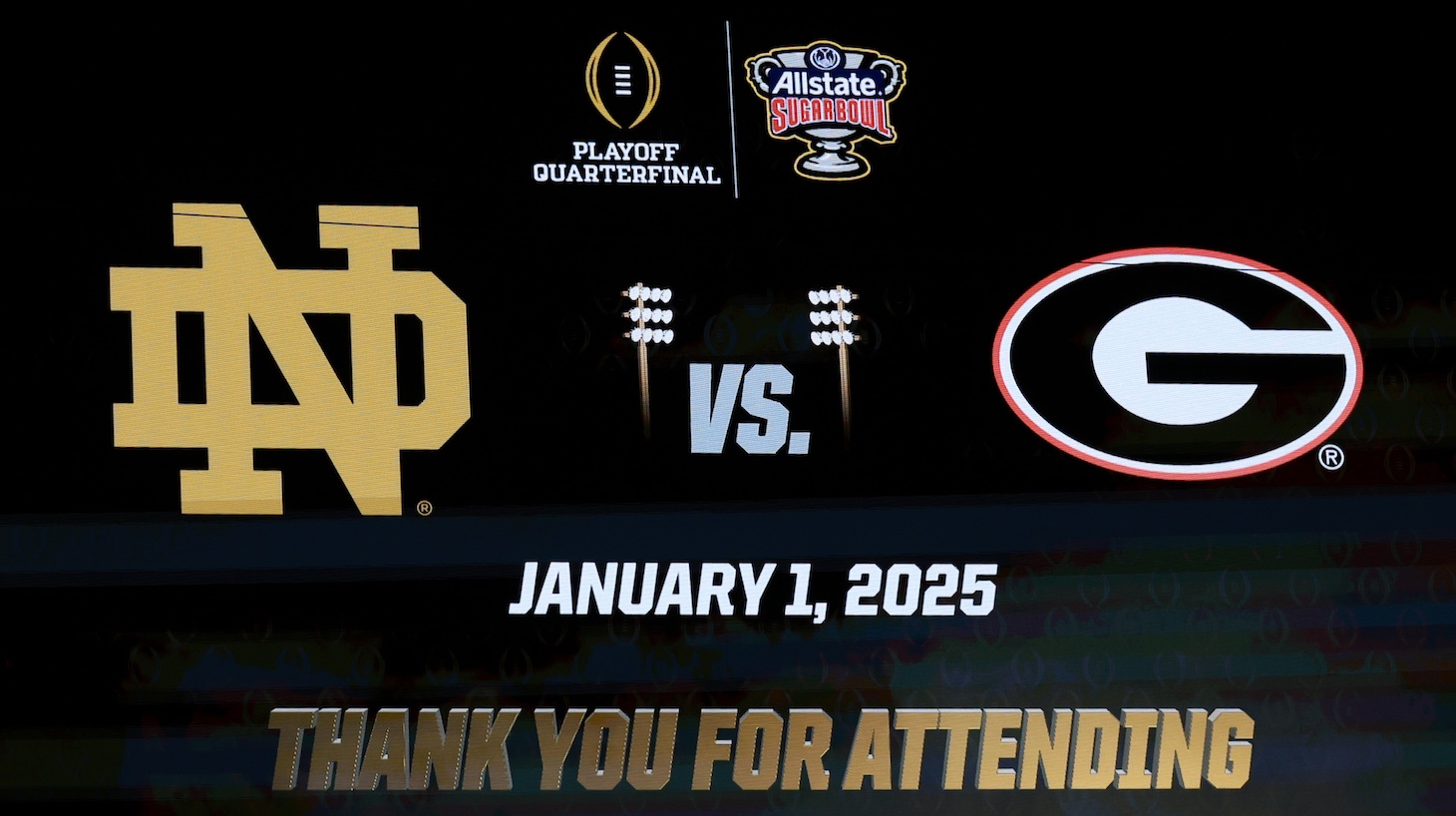The College Football Playoff is a wild hit so far, in that everyone hates it. Notre Dame beat Indiana Friday in a spectacular nothingburger that turned out to be the closest game of the weekend, and the three Saturday games were the competitive equivalent of Week 2 bodybag games decided by an aggregate score of 118-51. Even the gambling conglomerates were screaming and flipping off their gigantic monitors.
But in fairness, the four games gave the college football part of the nation exactly what it wanted, in exactly the correct gargantuan proportions because college football is the most predictable dodge in the entertainment diaspora, as explained by the following: Money was made.
Of course, money is always made. These playoffs are what all playoffs are: money grabs based on increased inventory. In that context, SEC commissioner Greg Sankey and his Big Ten counterpart Tony Petitti are just trumped-up hedge fund operators. These playoffs, though, were merely an intermediate step toward the ultimate goal, which is reducing major college football to the SEC, Big Ten, and a few strays here and there. After the century-long attempt to make college football a national sport, the folks in charge are in the process of abandoning that strategy to instead slag it up and go where the money is, which is in the Midwestern and Southeastern parts of the country. This is done with the support of the huge majority of the customer base, which has spent this weekend killing Indiana, SMU and Clemson as unworthy of attention, and in this case for good reason. Only a very few teams per year have even a counterpuncher's chance of winning it all, and those teams get a yearly reminder at some point that money talks and Cinderella walks.
To that end, the format was gamed from the start, sticking the bottom four seeds in games at the opponents' home stadiums, a significant advantage on top of the other competitive imbalances they enjoyed, hence the first-half leads of 14-0, 21-0, 21-7 and 28-0 in the four games. By halftime, the cries in support of big names kept out of the playoff (see: Alabama) reminded us that college football hates upstarts, and would just as soon have a format that ignores regular-season accomplishment entirely and just takes the same 12 teams every year. That's probably why the perfect bracket is 16 but the perfect college football bracket is probably closer to six, and why almost everyone who worships the sport hates Oregon, Boise State and Arizona State not only for getting first-round byes but also for not being Alabama, Alabama and Alabama.
In all other sports, huge upsets and extraordinary cliffhangers are much to be desired, but college football works on other stuff—namely, can my team destroy your team by halftime? Given that so much of the sport is decided by committees of old functionaries with sliding scales of what they consider important from year to year, reputations are made on two of three categories: strength of schedule, margin of victory and brand recognition. We are not mentioning horse-trading among committee members only because we can't prove it, though "committee" comes from the old Latin word for "you scratch my belly and I'll rub behind your ears." None of this 12 vs. 5 basketball upsetmania for these mechanized beasts. Here, the law of the land is the divine right of kings, and everyone seems satisfied. This weekend, the big brands won, and they won by a lot. Mission accomplished.
Nothing says old-timey graft quite like college football traditions, and the backdrop of the next round is Penn State-Boise State in the Fiesta Bowl, Ohio State-Oregon in the Rose Bowl, Texas-ASU in the Peach Bowl and Notre Dame-Georgia in the Sugar Bowl. Except that they are now all reduced to the encompassing moniker, "quarterfinal," and nobody will remember who is playing in what bowl because the "bowl" aspect is now entirely irrelevant. College football is going to struggle with this historical anomaly awhile longer, as will conference realignment, because the job of sifting through the outworlders has not yet been completed, but for now the blazers will endure. Kind of.
Yes, the games were massive letdowns, and nobody will remember them by Tuesday because there are four new games and 400 new scenarios to concoct. Next week brings new promises, and next year brings new committee members and criteria. It is the nature of the beast to bank on our short attention spans because, well, that's now the greater system of sport works. Today's outrage is quickly replaced by next week's hope, and we recall nothing after a week in the rearview mirror. Curt Cignetti? Who's that?
Traditionalists love this because Notre Dame has been living off its name since losing the BCS Championship to Alabama by a thousand points 12 years ago and then having their 12 wins vacated by something called the NCAA, which used to be a thing the way the Ottoman Empire used to be a thing. This Notre Dame team, on the other hand, has a deserved vibrancy under the over-criticized coach Marcus Freeman, and your parents and grandparents will be pleased in ways that napping through Buccaneers-Packers cannot match. And who doesn't love grainy film of Knute Rockne chewing gum?
In all, the games were a drag, and there will be games next week. And remember, if the games had been great, we'd still feel the same way. Nothing changes more than college football and nothing changes less than the way we experience college football. In other words, go Alabama, wherever you are.






